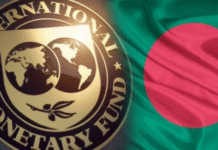Bangladesh earned $14b last year
Bangladesh earned a record amount in remittance, more than $14 billion, and exported the second highest number of workers last year despite the Middle East crisis, said researchers.
The remittance earning of the country was around $ 13 billion in 2011.
Last year, Bangladesh exported more than six lakh workers. The largest number of workers, more than eight lakh, was exported in 2008, said sources of the Ministry of Expatriates’ Welfare and Overseas Employment.
Although the migration rate increased by around 6 percent in 2012 over 2011, the growth rate began to decline from September owing to the United Arab Emirates’ (UAE) sudden ban on manpower recruitment on various grounds, including allegations of malpractices in recruitment, said a report of Refugee and Migratory Movements Research Unit (RMMRU).
The RMMRU, a non-government organisation that works with migrants, said the UAE had received the largest number of workers, around 44 percent of the total Bangladeshi migrants, last year. The rate was 50 percent in the previous year.
Oman is in the second place for recruiting 25 percent while Singapore third for receiving 9 percent Bangladeshi workers last year, said the NGO.
The manpower sector might face a big jolt as some other major recruiting countries of the Middle East, including Saudi Arabia, Kuwait, Libya and Iraq, were not recruiting Bangladeshi workers on a regular basis, said experts.
Bangladesh Association of International Recruiting Agencies (Baira) is worried because the Middle Eastern labour market is gradually being closed for the country.
Baira President M Shahjalal Majumder said the remittance inflow would be impacted negatively if the government failed to send workers to the Middle East countries on a regular basis.
“If migrant workers start returning home in large numbers and the flow of outbound workers is put on hold, the inflow of remittance will be hit hard and the national economy will suffer heavy losses,” he told The Daily Star recently.
Expatriates’ Welfare and Overseas Employment Minister Khandaker Mosharraf Hossain, however, ruled out the apprehension. “Earlier, Bangladeshi workers used to go to only 77 destinations but now the door is open in 157 countries. So, no major problem will emerge in the sector due to the UAE ban,” he said.
Currently, more than 60 lakh Bangladeshis work abroad and the majority of them are in Saudi Arabia, the United Arab Emirates, Kuwait, Oman, Qatar, Bahrain, Malaysia, Singapore, and Libya.
Kuwait stopped hiring from Bangladesh in 2006, citing malpractices in recruitment. Since early 2008, Saudi Arabia significantly reduced the number of Bangladeshi workers it used to hire.
A report of the Transparency International Bangladesh (TIB) said “the labour migration sector tops the list in corruption rate” last year. But Khandaker Mosharraf disagreed with it.
The TIB report said around 77 percent job seekers in the migration sector has to pay a good amount for bribery and irregularities.
Meanwhile, Bangladeshi household helps are now being recruited in Middle Eastern countries, which is a silver lining. Lebanon happens to be a prospective destination for them.
The government has also succeeded in sending workers in Malaysia under state arrangements, as the government of that country decided to recruit Bangladeshi workers again in the plantation sector lifting a four-year ban.
In the first phase, it will take 10,000 Bangladeshi workers under a Memorandum of Understanding (MoU) between Dhaka and Kuala Lumpur.
The country had imposed the ban in 2009 on the allegation of irregularities in recruitment.
Source: The Daily Star










